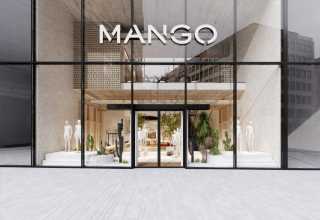
An Elevated Brick-and-Mortar Format for Mango
Mango, the giant Spanish fashion retailer with a global footprint, is elevating its look with a Mediterranean-style, environmentally conscious brick-and-mortar format opening in Düsseldorf, Germany, in March.
Mango, in its announcement on the store, cited sustainability, energy efficiency and architectural integration as key objectives for the brand, and said, “For this reason, [the company] has designed an evolutionary concept.”
Mango stores are being rigged with energy-efficient lighting, temperature control, as well as a design that incorporates sustainable materials such as natural paint. Mango is also involved in collecting used clothing and footwear for their reuse, recycling and energy assessment.
The Dusseldorf store is being designed with warm tones and neutral color bases combined with traditional, artisanal, sustainable and natural materials, such as ceramic, tufa, wood, marble, esparto grass and leather.
The store, which has more than 15,000 square feet of selling space, is located in the Kö-Bogen II building, also known as the “green building” for the huge mass of vegetation that covers its facade.
“Our industry is undergoing a complete transformation, and Mango is, too,” said César de Vicente, Mango’s global retail director. “The stores have always been a privileged meeting point between customers and our brand, which is why we want to offer customers unique and personalized experiences, supported by technology and omnichannel services in a welcoming environment.”

Related Gallery
Hubert de Givenchy’s 1970s Black Cabine Models Made a Statement About Diversity
Jan Rivera, Mango’s creative and image director, said: “Through this new store concept, we aim to reflect the essence of the brand. Mediterranean culture forms part of all we do as a brand and those of us who are behind the brand, so we want to approach our customers with this philosophy.”
To advance the customer experience, Mango has an “innovation community,” a forum in which customers can express their preferences, opinions and expectations regarding the company’s products and business strategies. Findings from the forum resulted in Mango creating “a functional, relaxed and welcoming environment in which it can promote and facilitate interaction between the customer and store staff. At the same time, it has incorporated new services and features, such as the concierge station, a point of reference where the store staff can deal with any requirement customers may have, as well as more spacious fitting rooms and cash desks on all floors.”
Mango also said it “remains committed to omnichannel retailing and, in addition to a large click-and-collect area, new areas will display exclusive online collections, which customers can see and try on in the store.”
Furthermore, analytics, which Mango referred to as “deep learning” technology, combined with RFID technology, will supply data to store staff so they can implement continuous improvements relating to garment availability, the distribution of collections and in-store browsing.
The Spanish fashion brand is extending its range by launching a Mango Casa home collection on the company’s website beginning in the second quarter of this year and in 20 European markets, including Spain. The products, also with a Mediterranean look, will be available in Mango stores as well through the use of tablets by store personnel.
The Barcelona-based Mango was founded in 1984. The company’s extensive store network reaches 110 countries and occupies more than 8.6 million square feet. Mango, from its “El Hangar” design center in Palau-solità i Plegamans, every year designs more than 18,000 garments and accessories reflecting the season’s trends. In 2019, the company generated sales of 2.374 billion euros, of which 24 percent was through e-commerce.
The spacious Mango store opening in Düsseldorf in March.
Source: Read Full Article
